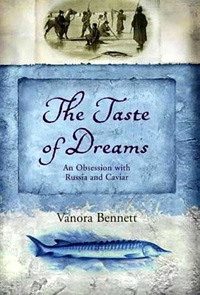10.19.2004 13:24
 The St Petersburg Times
The St Petersburg Times
By Michele A. Berdy
Special to the St Petersburg Times
Vanora Bennett fell in love with Russia as a child, in an English garden, over a bit of lumpfish caviar served by her mother as a birthday treat. Years later, having traveled as a journalist through Russia at the height of the post-Soviet chaos, she still remembers that first impression. "Caviar meant Russia to me, and Russia meant escape."
Bennett's aptly titled book, published last year and recently released in paperback, is about dreams and obsessions. It is neither a rounded portrait of Russia, nor a field guide to caviar. Rather, it follows the author's path from restless girl to reckless adolescent to ambitious young journalist in 1990s Russia. Caviar is one of the obsessions that lures her to Russia, and one of the disillusionments that sends her back home.
Entranced by Eastern European emigres and fairy tales, Bennett studies Russian in the West and then in Soviet Leningrad, where she has "a brief career as a Russian gangster's moll." In less hyperbolic terms, she falls in with a group of fartsovshchiki, or black marketeers, who provide her with her first taste of real caviar - produced from under the table by a waiter looking for a kiss - and whet her appetite for more.
The ticket back to Russia is through journalism, and - between her story and the history of sturgeon fishing, the caviar industry and azart, a word meaning "heat, excitement, fervor," the thrill of the hunt or a gamble, which she elevates (with questionable linguistic accuracy) to the guiding principle of the Russian 1990s. It is, she asserts, "an extreme form of acute compulsion known only in Russia. ... It means taking risks, and not giving a damn about anyone or anything as long as you get what you want. And it means not being satisfied that you've got enough till you've got far too much."
Which brings Bennett to the caviar industry, from the wars to win fishing rights in the Caspian Sea, to the communists' hellbent pollution of the sturgeon's spawning grounds, to the poaching of the post-Soviet era. While one could argue that caviar hunting is more a matter of greed than gambling, Bennett's statistics are staggering: In 1958, more than a million sturgeons were registered in the spawning grounds of the Volga; by 1987, there were just over 2,000. And the official catch fell from 15,000 tons in 1990 to 650 by 2001 - with an estimated 10,000 tons poached.
Bennett's writing often becomes overwrought when describing this tawdry side of Russia. "[Caviar's] taste," she writes, "also recalls the dashing, freebooting lifestyle of the free Cossacks, who are revered to this day for never knuckling under to the powers that be." For her, maybe. But not for most Russians, who give their children thick slices of bread slathered with butter and caviar the way American mothers give their children vitamins. To Russians, caviar is no more redolent of risk than a bowl of cornflakes.
But Bennett isn't interested in the mundane. The Russia she evokes is one of "knife fights and gunfights and bottle fights and protection rackets," where women sell themselves or their household possessions, where everyone has a get-rich-quick scheme and an air of desperation. Her prose is uneven: graced by lush descriptions and vivid, spot-on images, and yet peppered with inaccuracies, such as placing the 1998 plummet of the ruble in 1991, and hyperbole, as in the "sometimes surly, often drunk, and possibly violent [taxi] drivers of Moscow" - a breathtaking exaggeration. She barely sees, or barely writes about, the more humdrum lives of the majority of Russians not infected by the madness of what she calls azart.
She is herself infected, following hot stories through war zones, recklessly drifting into marriage, covering a slow-motion coup in Azerbaijan. What interests her most is not the journalism itself, but her increasing distaste for the edgy atmosphere around it.
If at first one senses a certain glance-over-the-shoulder self-righteousness in such words, over time Bennett's disgust becomes genuine. The razzle-dazzle of the "dollar bubble" of foreign privilege loses its allure. She scores caviar in the south and then dumps it in the trash can. Her search for an ancestor - a relative named Horace Wallich who once worked for Faberge - crowds out her other interests. "I was surprised at how much I wanted to reclaim my lost family," she writes. On a trip back to England, she tells her estranged father about her search. "You mean Uncle Horace?" her father asks blandly. The answer, like Dorothy's ruby slippers, had always been available to Bennett. And, like Dorothy, "It was just beginning to dawn on me that I might enjoy coming home."
Before she leaves, Bennett takes one more trip to the south, where she meets with a quiet typesetter who was once imprisoned for poaching sturgeon on the Volga. The story he tells is simple and moving: He chased after fast money and power, he got caught, he served his time and he starting writing poetry. Now he works as a typesetter and only eats a bit of fish, "so as not to lose the taste for it altogether. But caviar makes me sick to my soul."
Perhaps, like all foreigners who fall in love with Russia, Bennett is lured by what she dreams she will find. Self-destructive, reckless and ambitious, by her own admission, she discovers a country that mirrors herself and dashes headlong into the abyss. It's only when a St. Petersburg friend tells her, "Go home. Don't come back (except to see us)," that Bennett returns to her "blameless, bourgeois English life."
Michele A. Berdy is a Moscow-based translator and interpreter
News source: times.spb.ru
 Print this news Print this news
Culture news archive for 19 October' 2004.
Culture news archive for October' 2004.
Culture news archive for 2004 year.
|